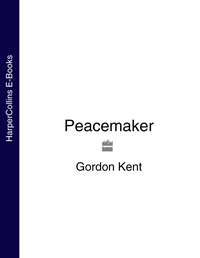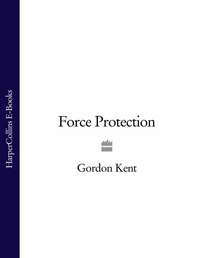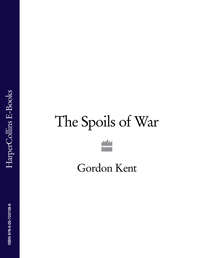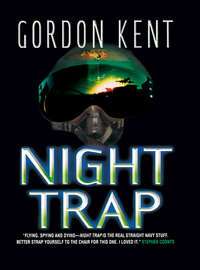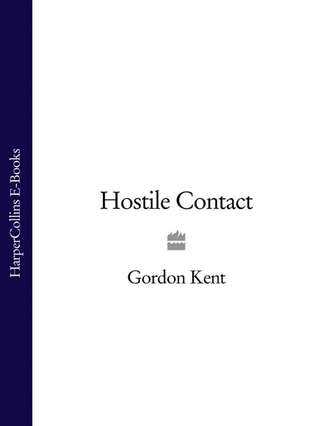
Полная версия
Hostile Contact
Bobby felt nauseated. Surely it couldn’t be happening. Surely—were they testing him? Did they know all about Andy, after all?
“Well?”
Bobby forced himself to mumble, “Yes, sir,” and Qiu spoke to the driver and the car rolled to a stop. Again, the man in the jump seat opened the curbside door.
“Get out,” Qiu said. “You will be at the Fantasy Island Park in precisely—” pausing to study his watch—“one hour and forty-two minutes. Meet me at the main gate. Now get out.”
Bobby Li stepped into a puddle. The car pulled away, sending slow waves over the tops of his shoes. He watched it go, unable even to step up on the curb. At ten minutes after nine, he was supposed to meet an unknown American in the Orchid House for Andy, but at the same moment he was also supposed to watch Qiu meet the same unknown American in the same place. His life had turned into a contradiction. And a mystery: nobody had told him why Qiu was doing this to him!
He walked home. Passing the telephone, he thought of calling Andy and telling him—what? That he was too sick to go? No, you were never too sick for an operation, not when it was Andy, and not when it was for George. Tell him that his Chinese masters also had a job for him? But Andy didn’t know about the Chinese masters, and, because Bobby loved Andy, he couldn’t let him know. It would make Andy hate him, and he couldn’t bear that.
Loyalty, Andy said. It’s about loyalty.
He let himself into his house and sat in the little front room. His wife came in and stared into the dark where he sat, then went away.
Bobby thought it through. He had to do what Qiu said. He knew what the punishment would be if he did not—Loyalty Man’s attitude had told him that the thing was serious and out of his hands. To disobey was to end his life here, his family’s life. Maybe to see his children shipped to China, to disappear there. Therefore, he would have to do as Qiu ordered. How, then, would he keep Andy from knowing what he was doing? If he stayed far enough back, maybe Andy wouldn’t see him through the greenery—was that possible? But even then, there were the photos—Ho was supposed to get photos. Andy would see the photos.
And, of course, Andy would see Qiu meet with the American.
I never saw him before, Andy; he stole The Economist from me and his guys held me and he went into the meeting—
Andy wouldn’t believe it. Andy didn’t believe in unmotivated acts.
Well, the photos. Maybe he could just not hand over the film. No, Andy wouldn’t believe it if he said he lost it or Ho kept it. Or he could expose the film—pull it out of the canister. No, Andy didn’t believe in accidents, either.
But if the photos were simply bad photos—out of focus, for example—
Bobby went to the bedroom and turned on a light without warning his wife and without apologizing. He took his own camera from his drawer, hesitated, and then burrowed deep under his four shirts and took the gun that was concealed there. In the bathroom, he opened the camera—his pride, a good Nikon, 3X zoom, internal motor drive—and smeared Vaseline on the inside of the lens. He put in a roll of film.
Back in the living room, he sat with the gun and the camera in his lap. The gun had lost most of the bluing at the end of the barrel and a lot along the edges of the slide. It was a thirty-year-old Walther PP .32, an old police pistol from somewhere in Europe in the days when policemen could enforce the law with little guns that were now thought too weak for even ladies to carry. He put on a light. He took out the clip. Seven cartridges, their ends open—hollowpoints, segmented for expansion. Like looking into the heart of a flower. Well, you could kill with those.
It had been so good for the first day with Andy. Now it was all awful. He went back to the bedroom and began to change his clothes.
“Is it bad?” his wife said.
“Don’t take the kids to school today. Take them to the place in Tangerang.” He had a shack out there under a different name. Sometimes he went there to be alone. He had a garden out there, like his father. “Park the car in the trees, where it can’t be seen from the road.”
“How bad is it?” she said.
He finished dressing. Out of deference to her, he hadn’t brought the gun back into the bedroom. “It will be all right,” he said. He kissed her and went into the living room and put the gun inside his waistband just by his right kidney, and he picked up his camera and went out. It was daylight.
USSThomas Jefferson.
Cyclic air ops went on, creating thunder that went pretty much unnoticed in the corridors of the O3 level. In the ready rooms, crews preparing to fly were gathered around the TAMPS; others stood or sprawled to watch ongoing landings on the Plat camera. For the air group commander, a walk past the ready rooms was a mixture of envy, nostalgia, and irritation, the last because every squadron had its own problems, its own flaws, which he was supposed to solve and correct. To Rafehausen, who wasn’t flying that day and who could hardly find time to fly enough to stay qualified, the ready rooms were also a nagging reminder of what he had given up.
“Approval came through for Craik’s orders to Miramar,” a voice said at Rafehausen’s shoulder.
“Say again?” Both men flattened themselves against the bulkhead as a cluster of aviators hurried past. “Sorry, Deak, I was wool-gathering.”
“Not important. I just saw a message that Al Craik’s orders to Miramar to advise a second MARI det will be cut in a couple days.”
It took an instant for Rafehausen to switch focus. Then: “Oh, sure. Right, I wanted to find something for Craik. That’s great!” He detached himself from the bulkhead and started toward his office. “What’s being done about the parking problem behind cat three? They were supposed to have the mess there cleaned up by 0600 and now I learn that—”
Overhead, the engines screamed and the colored jerseys moved and spun, and aircraft blasted into the sky, and Alan Craik was forgotten.
5
Jakarta.
At five-thirty Alan was up, adrenaline and delayed jetlag combining to get him out of bed and into the shower. He had been awake for a long time, waiting for the alarm, and he was charged with energy, like a kid waiting for his parents to get up on Christmas morning. He shaved and had a long shower, humming something he had heard the day before, and then dressed carefully in slacks, a fancy T-shirt and the linen jacket Rose had packed for him. He felt that he looked like Don Johnson in Miami Vice, but so did everyone else in Jakarta. The air outside was already hot and heavy with moisture by the time he emerged to catch a taxi, almost an hour early. He told himself that he would spend the extra time making his route really complex. The truth was, he had to get out of the room.
Make some stops before you get to the park, Triffler had ordered without really explaining why. Alan knew it had something to do with helping his minders make sure that he was clear of surveillance, but Alan couldn’t for the life of him see how he could have acquired surveillance in Jakarta when traveling on his own passport. Nonetheless, he obeyed. Coffee and a decent roll were high on his morning agenda, so he asked the cabdriver where he could get the best cup of coffee in Java. The man smiled wickedly, as if he had just been asked where to find something far more sinister, and he left the curb with a jolt reminiscent of a cat shot.
Twenty minutes later, his insides comforted by a chocolate croissant and a cup of excellent coffee, Alan left the café and walked through the steamy morning. He window-shopped along a closed arcade and made left turns until he found an open news store, the magazines and newspapers international and mostly concerned with the upcoming presidential election in the United States. The subject didn’t interest him much, but he had a tiny cup of espresso and bought a local Englishlanguage paper, skimmed it to eat the rest of his surplus time, and departed with a much better understanding of the economy of oil in Indonesia.
His second cab of the morning was duller; the driver was quite young and didn’t seem to want to talk. He made good time, though, and Alan arrived at the gates of the park that contained the Orchid House with fifteen minutes in hand and a charge from all his energy and caffeine on top. He was beginning to feel nervous, the nerves of inexperience, concern about making mistakes through ignorance—feelings he hadn’t had in a long time. Then he told himself, for the twentieth time, that nothing was going to happen, and he sagged and felt the fatigue under his energy.
It was damp and hot. He started to walk.
Washington.
Dukas had got as far as suggesting to Sally, while Rose was out of the room, that they maybe check out his apartment, and then the shit had hit the fan. He had hardly tried his dessert when she had seen something in his open attaché and gone through the roof. “What the hell is this?” she cried.
“Hey, what—?”
“What the hell are you trying to pull?” she said. She didn’t seem vulnerable any longer.
Dukas misunderstood. He thought it was something about his clumsy approach to sex. “Hey, I was only—”
She tried to speak, moved her lips to form words that didn’t come, and then slapped the attaché and shouted, “This is Chinese Checkers!” She began to scrabble in the old papers, knocking them out of their neat alignment, dropping some on the floor and not caring.
“What the hell?” he said.
“You bullshitter, what have you done to—” She shook the folder. “This is the Jakarta part of Chinese Checkers!”
Dukas tried to focus. He had an idea what the code name Chinese Checkers meant. Chinese Checkers had been a CIA operational project—a comm plan that George Shreed had covertly used to meet with his Chinese control. When Dukas and Alan Craik had gone into Pakistan after Shreed, they had known he was following one of the Chinese Checkers comm plans to a village near the Kashmir border. That’s how they caught him—because Sally Baranowski had illicitly given Dukas a copy. But he had seen only the Pakistan section, and then only long enough to know where Shreed was going.
But Jakarta?
“Chinese Checkers is a defunct Ops comm plan,” Sally Baranowski snarled now. “And now here it is! I risked my fucking career to give you this stuff, and you’re walking around with it in your attaché!”
Dukas didn’t say that everybody walked around with classified material in his attaché. He was too stunned by what she was saying, stunned by the implications. A warning bell was sounding in his head. “This is Chinese Checkers?” he said.
“What did I just say?”
“Maybe it’s just like Chinese Checkers. Sally, it can’t possibly be—”
She simply looked at him.
“This comm plan can’t—I don’t see how it can be part of Chinese Checkers.” He grabbed her upper arm, then let it go and leaned back so she wouldn’t think he was bullying her. “I just sent Al Craik to Jakarta to roadtest it. He’s there right now.”
Sally stared.
“All I’d paid attention to in Chinese Checkers was the Pakistan part. I didn’t even read the rest. If this is really—”
Her look told him everything. She said, “I helped Shreed edit Chinese Checkers. I used to pull it up to see why it never got activated. There were three comm plans, Mike—Pakistan, Nairobi, Jakarta.” She picked the pages up again. “And why the hell is it typed this way? It’s beat-up, like you’ve had it forever. I didn’t give it to you like this—I gave you a goddam floppy! Where the hell did you get this?”
“It’s part of Sleeping Dog.” Even as he said it, Dukas saw the abyss that was opening.
“This was never part of Sleeping Dog!” she shouted. “Never, never, never!”
He realized that Rose was standing in the doorway and that she had heard. He ran for the telephone.
6
Fantasy Island Park, Jakarta.
Jerry Piat was up early and feeling good—rested, strong, wired just enough to stay alert. He got a paper cup of coffee and walked to the park. He took his time; it was only a little after seven, the streets already hideous with traffic, sidewalks still puddled from a rain that now steamed in early sunshine.
The Glorious Mornings. Title of some book. Nice phrase.
He looked around like a tourist, checked out a couple of ethnic displays, tossed his coffee cup at an overflowing trash bin, and went into the Orchid House.
Bobby Li hitched a ride on the back of a scooter to within five streets of the park gate. He’d shoved the gun down into his pants, with a loop of string holding it to his belt, a trick that George had taught him and that he said his side had used in World War II. The Economist and the envelope full of newspaper that was supposed to be money were inside his shirt. He kept the camera in view, like a tourist.
His heartbeat was way up. He thought a heart attack might be a good way to get out of this fix. His wife would get the business and a little insurance, and Andy and Qiu would forget him. But his heart wouldn’t cooperate.
A woman in a headscarf was sweeping the area in front of the park gate. He went around her and sidled in, looking for Ho, anxious not to miss him. Ho was lazy and would more likely be late than early. Bobby walked around, feeling his bowels get queasy. He couldn’t do it, he thought. He couldn’t walk in there behind Qiu and risk Andy’s seeing him. He was in a vise, being squeezed.
Ho grunted behind him, and Bobby whirled. His breath came too fast, and he had to breathe through his mouth or faint. “Give me the camera,” he managed to say. He had just seen, beyond Ho, a Chinese who looked professional and dangerous. But every Chinese he saw today would look as if he belonged to Qiu. “Don’t give it to me here; walk down to the toilets and meet me in the men’s.”
Ho walked away. He was eating an Indian sweet, slender coils of orange jelly. The smell of it made Bobby sick.
In the men’s room, he stood next to Ho and tried to piss. Ho was making water like a fire hose. Bobby strained; nothing came out. The vise was squeezing even his piss.
He put his own camera, the one with the grease on the lens, on the metal urinal. Below it was a wall of metal over which water ran, splashing their shoes. “Take this camera. Put yours there so I can take it.”
“Why?”
“It’s a better camera.”
They switched. Bobby said, “Take the pictures, and the moment the meeting is over, get out. Get your people out. You meet me by the east door and hand me the camera, and we’re done.”
“Not until you hand me the rest of the money.” Ho zipped up as if he was tightening a garrote.
“Right. You hand me the camera and I hand you the money.”
“Wrong. You hand me the money, and I hand you the camera.”
Bobby went out and walked up and down, keeping an eye out for Chinese men, glancing every half-minute at his watch, looking for Qiu. One of Ho’s team found him and gave him a Walkabout, which he had altogether forgotten. It seemed like one more terrible thing, one more burden—if the Chinese saw him with the handheld radio, they’d kill him. Or drag him off to the embassy, which would in the long run be much worse. He walked around the back of the toilets and smashed the radio under his foot and threw it into a tangle of weeds, then threw Ho’s camera after it. The less baggage, the better.
Washington.
Dukas and Sally Baranowski sat in Rose’s living room. It was going to be a long night.
A woman with a young voice and a thick Asian accent at Alan’s hotel had assured Dukas that she had tried the room three times, and, yes, she had the right room, and, no, Mist’ Cra-ik not answer. Dukas had looked at his watch for the tenth time since Sally had told him; it was by then eight-thirty-five in Jakarta, and Al Craik was already out of his hotel room. No, no, no, Dukas was saying. Don’t go this early—! He had left a message for Craik to call him at once; then he had tried Triffler, but Triffler still hadn’t checked in. The duty officer at NCIS told him that the last word they had was that Triffler was still in Manila.
Sally Baranowski now understood exactly what was going on. “How bad is it?” she said.
“Maybe pretty bad. I don’t know.”
She was an experienced operations officer. “If you don’t know,” she said, “then it’s pretty bad.”
“If you’re right about Chinese Checkers—”
She was contemptuous. “There is no ‘if.’ I’m right. So what is part of Chinese Checkers doing in a file about radio intercepts in Seattle?”
Dukas shook his head. Sally had his attaché open on her lap, and she took a sheet of memo paper from the Jakarta folder, smoothing the creases. It looked like the other papers, a little old, a little weary. It had a yellow fold-down FBI tab. “This is an FBI cover sheet,” she said.
“Yeah.” His voice was empty. “It’s supposed to date from the time when the Bureau had the case.”
“No way. The Bureau never had Chinese Checkers.”
She held it up to the light. There were columns for dates and times and signatures—a record of who had seen the pages and when. “Not much,” she said. “Only three names. Seven years ago, supposedly.” She brought her arm down. “Bullshit.”
“Check the document history.”
“‘Acquired 24/9/94 via Long Shot from E75P3211. Unverified. Authenticity 3, Reliability 3.’” She looked at Dukas. “What the hell is this shit?”
“What’s Long Shot?”
“Long Shot was a big buy from some very questionable sources after the Soviet Union went belly-up. Mostly in the ‘Stans,’ mostly KGB stuff, but there was some Chinese and Indian material in there, too. We never trusted it, never were able to use most of it. But no way is this comm plan from Long Shot.”
Dukas simply looked at the pale wall, waiting. She was sitting there now with her eyes slitted, staring at someplace he wasn’t allowed to go. “George Shreed would never have knowingly given Chinese Checkers to anybody,” she said. “The only way it could have shown up in the Long Shot buy was if the other side had got it somehow, and then after the end of communism, they sold it back to us.” She shook her head. “But it won’t wash. George would never have let it get out of his hands.”
“Yeah, but if he secretly used Chinese Checkers to meet his Chinese control, then the control had to have a copy, too. It could have got into the Long Shot buy that way.” Dukas was eager to authenticate the Jakarta comm plan, to tell himself that, after all, Al Craik was safe.
“You know that’s not the way intelligence works! It’s not the way George worked. If China had a top spy in the Agency—as they did, in him—then, by God, they wouldn’t have his comm plan someplace where it could be sold off to the highest bidder.”
Dukas stared at a rain-spotted window. “So how did it get into this file?”
She had no answer.
“If you’re right,” he said, “then the cover sheet and the document history and all that about Long Shot are forgeries.” He rubbed his eyes. “Somebody’s planted this stuff on me. And I’ve sent my best friend off to check it out.”
Fantasy Island Park, Jakarta.
To Alan, the park seemed empty. The night’s rain had left a faint gleam over the stones in the early morning light, but the only people in the park with him were the grounds crew and a few Chinese tourists and a school group of local girls in white shirts and ties and plaid skirts. Alan smiled, thin-lipped and tense, and moved on, heading for the first performance of the park’s Javanese dancers.
The dancers performed in a kiosk across from the looming concrete and glass of the Orchid House. Alan tried to see inside, but the fog of condensation on the walls of the greenhouse was impenetrable. It was hot already, with the heavy air of full humidity complicated by massive smog, but the lithe girls danced smoothly despite the early hour. The performance didn’t last long, and Alan was one of five members of the audience. All the rest were Asian, and Alan wondered if any of them was his target.
Bobby Li lingered where he could watch the front entrance to the Orchid House, knowing the American would go in there. Andy had said so. He was trying to cut down the variables in this horror, even though seeing the man, being able to recognize him, wouldn’t help matters much unless Bobby could get inside and get to him before Qiu did. It wouldn’t work. Nothing would work. He leaned back in the shadow of a pillar and gave a murmured whimper. A hand closed over his arm.
“Aaah—!” He spun, eyes wide, found himself inches from the face of Loyalty Man.
“Very nervous,” Loyalty Man said. “No reason to be.”
“Th-this Qiu makes me n-nervous.”
Loyalty Man spat and lit a fresh cigarette. “Your job here has nothing to do with Qiu. Qiu knows nothing. Qiu is like the wooden duck you put on the water to bring in the real ducks.” He pulled something from his lower lip, spat tobacco flakes. “You are to find if the person who makes the meeting with Qiu is either the American Shreed or Colonel Chen. You know both. That is all.” He inhaled smoke and looked at Bobby. “Orders from very high up.”
“But—” He started to say, But Shreed is dead, and remembered in time that he had learned that only from Andy and so wasn’t supposed to know it. “But,” he said instead, “it has been so long since I saw either.”
“I am told you knew both well. Do your job. Call me to report.” He walked away.
Bobby’s face screwed up as if he was going to weep.
Jerry had brought a piece of nylon parachute cord, which he tied across the rickety stairs to Treetops. He didn’t want any early tourists stumbling over him. Up on the viewing platform, he drew on a pair of gloves and located the gun and dragged it out, unrolling the mat to lie on. It was nice up there, a feeling of airiness and light, that tantalizing mixture of greenhouse odors in the nostrils. He looked through the scope of the SKS, unloaded it, checked the trigger pull, decided that it would do well enough. He reloaded it and laid the weapon next to him and looked down into the green and flowery target area.
“Report,” he said into his handheld. “One here. Report.” Bobby was Two. He should have said “Two,” but he didn’t. “Two?” Jerry said. After a silence, he said, “Three?” Three reported—that was the big ox, Ho—then Four, Five, and Six. “Two?” Jerry said again. Was Bobby out of range somehow?
It was eight forty-eight. Dukas should be in the park. “Anybody see our target?” He said it again in dialect, or as much dialect as he knew. An answer came, too fast, too local. “Say again?”
“Got a white man at the dancing thing. Not same as the photo.”
Shit. Maybe he wasn’t going to make the morning time. Maybe he was waiting until later in the day—overslept or got the trots or got laid. Or maybe he wasn’t coming. Or maybe he’d sent somebody else. “Two?” he said. “Two, answer up. Two?”
Bobby could see only one white in the dance kiosk, and he was young; his hair was dark and he had his left hand in bandages, none of which matched Andy’s description of the man he called Dukas. It suddenly struck him that perhaps the target wasn’t going to come, and his heart leaped. It was eight-fifty-three.
Qiu watched the American enter the Orchid House from twenty meters away, leaning over the railing of one of the reconstructed Sumatran houses, the long eaves shading the sun above him so that he could snap his first picture of him. He didn’t trust local people to do such things. And the American was carrying The Economist, so he was the man. Qiu checked his watch and saw that the man was four minutes ahead of schedule. Most unprofessional.
Bobby saw the American cross to the Orchid House, and he saw the copy of The Economist under his arm. And he was going in early!
Alan saw one of the Asian men on the platform to his right raise his camera, and his heartbeat rose to a quick march in his chest. This wasn’t a fake, Mike. That guy works for somebody else and he knows who I am. He just took my photo. Suddenly, Alan’s world changed, and the beautiful morning, the lithe dancers, the good coffee were all erased. He was in a foreign place, and he was alone.


